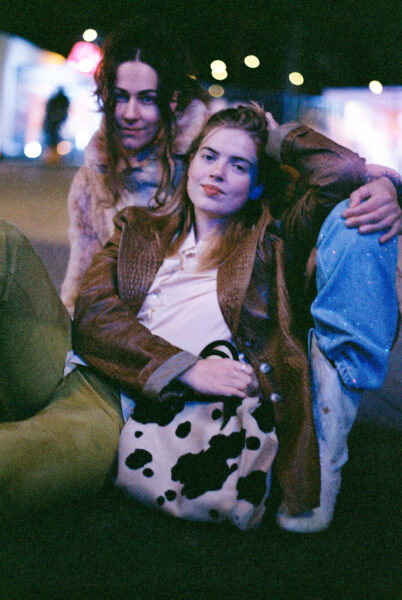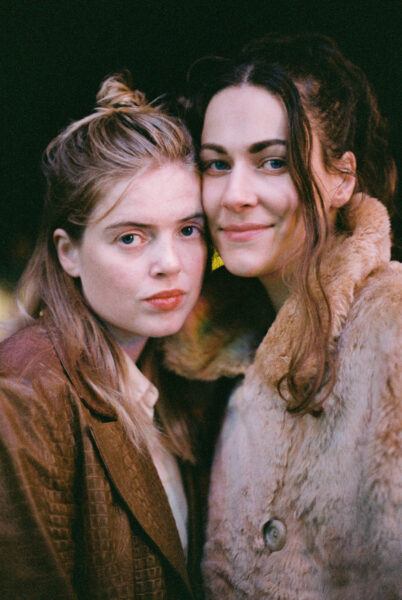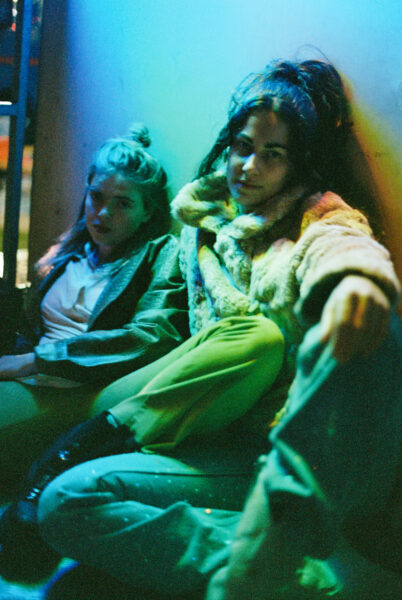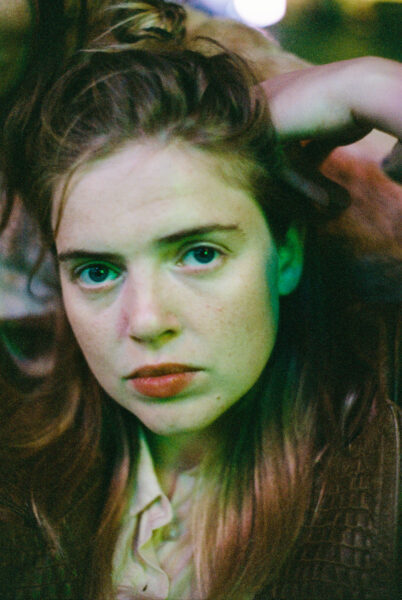Live music has taken a battering over the last couple of years, but Ultraflex have been one of the few glimmers of light in the darkness. The Norwegian-Icelandic duo, Kari Jahnsen (Farao) and Katrín Helga Andrésdóttir (Special-K), have been making dancefloors move until sweat falls from the ceiling over the past year, with their rough-and-tumble mix of pop, funk, disco, soul and synth soundscapes, and irrepressible attitude that falls somewhere between a purr and a snigger. That’s all been in aid of their new album, Infinite Wellness, which came out on Jahnsen’s own label Street Pulse in October.
To some extent, Infinite Wellness picks up the baton from their previous album Visions Of Ultraflex. The lush blend of synths the band builds their songs from means they sonically share a lot in common, with Infinite Wellness an evolution rather than baby-and-bathwater revolution relative to its predecessor. But at the same time, things have changed – the new album is a little wilder, a little more exuberant, a little more of a party record. Its cocktail of genres and runaway spirit make it unstoppable fun, a blast to listen to, but it also comes equipped with soul and smarts too – including a writing process that took in researching wellness culture and Danish poetry. We decided it was time for a chat with Ultraflex, to find out all about it.


To begin with the practical questions, at what point and where did work begin on album two?
Katrín: I guess it officially began in January 2021, when I spent a month in Berlin, and we went to the studio everyday. To lay down the groundwork. We had already started to talk about the album by then, I think we may have had the title by then. And some ideas for themes and names. But that was the first time we actually started to work on it.
Kari: I guess that was also the most intense body of work. After that month, it was more here and there, shorter periods of time, when we met up. But the first month was really intense, but that was a good thing. It was necessary.
Katrín: It was also lockdown in Berlin, so we weren’t doing anything else [laughs].
To talk about Ultraflex as a project. You both came into this having other pre-established artistic profiles and projects. Was making the second album a bit different to making album one? You had already established Ultraflex as a concept, going into writing the second one.
 Kari: Yeah, it was. Because with the second album you have these expectations that you don’t have with the first one. From yourself, but also from your fans. So you have to make a decision on whether to keep going with exactly the same thing, make a complete departure, or something in-between. I think we ended up with something in-between. There’s definitely something there, from the first album, but it’s also very different, I think. This is the second time that I have made a second album, and it’s always a bigger deal. It’s more work, it takes longer, there’s more to think through. It’s a more intense process. But I think we managed to find our way through, pretty well, and still keep the gist of the project, which is to have fun, and keep it joyful.
Kari: Yeah, it was. Because with the second album you have these expectations that you don’t have with the first one. From yourself, but also from your fans. So you have to make a decision on whether to keep going with exactly the same thing, make a complete departure, or something in-between. I think we ended up with something in-between. There’s definitely something there, from the first album, but it’s also very different, I think. This is the second time that I have made a second album, and it’s always a bigger deal. It’s more work, it takes longer, there’s more to think through. It’s a more intense process. But I think we managed to find our way through, pretty well, and still keep the gist of the project, which is to have fun, and keep it joyful.
Katrín: You hold yourself to a different standard. With the first one you’re just doing something, and maybe it turns out good. With the second one, you become more perfectionist. It takes way longer and it’s hard. But I still like the music, after all this time. After all the times listening to it and playing it.
Kari: The first time that I made a second album [Farao – Puro-O (2018)], I was so fucking sick of it by the time it was released. I just never wanted to hear it again. The process was too intense, and I felt very alone. I needed to put it behind me. With the Ultraflex album I don’t have that feeling at all. I still want to have it in my life.
Wellness Culture
If you take the title, Infinite Wellness, and the opener, “Relax”, with this almost parody of a beauty video thing in the lyrics. Was playing around with wellness culture a framing you wanted for the album?
Katrín: In the beginning, that was what we were thinking about. We listened to podcasts and read articles about wellness culture. I think “Run” is probably the other song on the album that’s mostly about that, it’s about not being able to keep up with all the expectations and standards. With that one, the lyrics changed a thousand times. It used to be more about doing yoga on your lunch break and eating expensive salads and stuff, but then the lyrics became simpler and simpler. But yeah, it was something on our minds when we started the process. But maybe something about writing it in deep lockdown made us want to think more about parties [laughs]. It became more about partying really.
Kari: I was also pregnant, so I really wanted to party.
It feels like an album that embraces hedonism, and the party, both in the music, which is very funk, Italo disco, Eurodisco, and also in the lyrics.
Even with a song like “Baby”, which is kinda a love song, it’s framed in that party, dancefloor atmosphere. Do you see that as one of the main themes of the record? Parties, hedonism, escape?
Katrín: I guess “Under The Spell” is kind of about escape. “Rhodos” is also about being far away, fantasizing in a way. Definitely partying, dancing, interaction between love interests. You could say the way Ultraflex usually projects that, is usually in a hedonistic way. We’re usually saying it from a perspective that is confident and flamboyant. A little bit full of ourselves. There’s also something about the soundscape that had the infinite wellness thing, lots of bells and chimes.
Kari: I like to think of synths as masculine or feminine sounding, and I feel a lot of the synth soundscape is very feminine and lush. Creating this softness. Which I think relates to the wellness theme. Not very harsh or rough, but soft and delicate. Like silk and feathers.
I thought in the context of that infinite wellness framing, that “Rhodos” is an interesting song. Because if you think about wellness culture, it’s very Instagrammable, very social media-focussed. “Rhodos” is about a form of partying that’s not very fashionable at all, going to a Greek island and getting shitfaced on cheap booze and dancing, which is not a very Instagrammable form of having fun.
Kari: This is true. It’s based on me going to Lanzarote when I was 16. I did exactly what the song depicts. And it was really fun [laughs]. Looking back, I’m a little embarrassed that I was that person. But I think it’s important to be that gross person, once in your life. We stocked up the fridge with like 5 litres of vodka and orange juice, and tried to meet the cute boys on the beach. It’s quite embarrassing to think about.
Katrín: There are amazing photos [laughs].
Kari: Yeah there are. We should probably post them. Because it is Instagrammable!
Katrín: If you have a little self-irony.
Ways of Speaking
We were talking a little bit about the sound of the record. And something that struck me was that a lot of the vocals are very soft on the ear, they whisper past your ear, rather than shout. They don’t usually take the main attention of the song, very rarely the dominant part of the song. I was wondering if that was how you wanted to design it, have the lyrics and vocals be more stream-of-consciousness, more subliminal?
Kari: It maybe just ended up that way. For me, the main thing is the beats and the bassline, the things that make you want to dance, and they have to be in focus for this kind of music. It’s not like pop music, where the vocal is the centre and everything else is built around it. We build stuff on top of the beats and the bass, and with that kind of approach the vocals naturally end up a bit behind in the mix. But I don’t know if I agree with that for all of the songs.
Katrín: No, I don’t either. Definitely on some of the songs, like with “Ultrasex” or “Relax”, the vocals are very distant. But I also feel like the vocal is quite in-your-face on “Under The Spell”, “Rhodos”. “Rhodos” is all about the image of the party, which comes through in the lyrics. I think it’s a mix, some of the songs are more ethereal and dreamy, and some are not. I think our lyrics are quite direct, and sometimes aggressive even. Maybe they’re spoken softly, but they’re very in-your-face.
Kari: But this way of speaking, this softness, is maybe also inspired a little by this ASMR-vibe we’ve tried to channel, in the “Relax” video. Where someone is whispering, and it feels like you’re standing right there. It was fun trying to recreate that vibe, with the vocal sound.
Do you often get inspired by exterior things when creating music, say like researching wellness culture, or ASMR? Is it often interesting for you to pick a subject like that, research it a bit and use it as a basis to write music?
Katrín: I think so. Like the first verse of “Melting Away”, which is very heavily based on a short story by Carmen Maria Machado, called The Husband Stitch. But we’re also very inspired by music. We listen to so many different types of music, from Norway, all over the world, from all different times. We borrowed elements from a wide array of stuff.
Kari: It’s a patchwork quilt of different influences. Take a guitar from this song, a beat from this one, the bass from another one.
Katrín: One of the examples we were very back-and-forth with is the little whispered intro from “Melting Away”, in Norwegian. It’s a quote from an 80s power ballad by Kari Bremnes (“Det Sandeste”). And that song is based on a poem by the Danish poet Tove Ditlevsen. So there are many layers.
Pop Culture Inspirations
Another question I had. You mentioned being inspired by a lot of other artists when writing the songs, Britney Spears, Usher. And saying “ok, this song is going to be our take on a Britney song” or whatever. Does it feel like Ultraflex is a place where you can live out those fantasies, where you can say “ok, let’s write the Ultraflex Britney song” or something? A playground where you can make that happen?
Katrín: Yes. But I would say it’s a little bit more complicated. Because we would never write just a Britney song. We would write a Britney song with just a 70s Italo beat, and then with saxophone or whatever. We would always complicate it. It’s never as simple as trying to mimic one artist. It’s always maybe like six, or more [laughs].
Kari: It’s fun to think of it as “what if these two artists that we love had made a song together?”
Katrín: And often it’s very contradictory artists, from very different times, backgrounds and countries.
What would you say are the most contradictory artists you’ve ever tried to bring together?
 Katrín: I’m always amazed that we managed to make “Mi Vuoi” work, with a beat inspired by Alice Deejay’s “Better Off Alone” and then the saxophone from this amazing saxophone player, who is a friend of ours, who’s very into jazz and free jazz and stuff like that. And we just told him to go crazy. It wasn’t inspired by anything special, but it’s a very different kind of music to the club Eurotrash thing [laughs].
Katrín: I’m always amazed that we managed to make “Mi Vuoi” work, with a beat inspired by Alice Deejay’s “Better Off Alone” and then the saxophone from this amazing saxophone player, who is a friend of ours, who’s very into jazz and free jazz and stuff like that. And we just told him to go crazy. It wasn’t inspired by anything special, but it’s a very different kind of music to the club Eurotrash thing [laughs].
Kari: I don’t know if I’ve ever heard that combination before, saxophone on top of a Eurodance vibe.
Katrín: And then these steel drums on top, with Caterina’s [Kuntessa] overtly-sexual Italian moaning. We weren’t always sure that that would work. We were so embarrassed when we showed it to the saxophone player, and wanted him to play over it. But he liked it!
Kari: The steel drum arrangement is actually very inspired by Steve Reich. Which is very different to Alice Deejay. We should also shout out our mixing engineer, who really helped bring the song together.
Katrín: And he pushed for the saxophone, which we thought about throwing out. But he tweaked it and worked on it until it was sublime.
The next question is about “Ultrasex”, which I guess was always going to be the title of an Ultraflex song at some point. For me, it’s a bit of an outlier on the record, in terms of how it sounds. Because it has this real, smoky, loungey vibe. So I was wondering what you guys saw as the role of that song on the album?
 Kari: We knew we had to make a song with this title. But actually “Mi Vuoi” was originally going to be called Ultrasex.
Kari: We knew we had to make a song with this title. But actually “Mi Vuoi” was originally going to be called Ultrasex.
Katrín: But I’m glad that we didn’t do that, because I think that may have been slightly over-the-top.
Kari: I’m really happy that it’s kind of an almost-instrumental, because I think the music speaks for itself on that one. The saxophone, guitar, and everything explains what it’s about.
Do you think it plays a nice role on the record, where it’s surrounded by these upbeat, dancey songs, and it brings this pause, deep breath moment, in the middle of the more high-tempo ones?
Katrín: I don’t think it was necessarily super-intentional, in terms of the structure of the album. It was more like we wanted to make something that was really sexy, but not aggressive, in the way some of our songs are. Just funky. The wah-wah on the guitar can almost be porno in a way. Also inspired by old Italian library music.
Kari: It was also fun to make a song that was mostly acoustic instruments. The beat is programmed, but it’s based off this Italian library track. What’s it called again Katrín?
Katrín: “Il Porto”, Alessandro Alessandroni.
Kari: So it’s based off a real drum beat. It was nice to do a song that is not only electronic stuff.
Katrín: I think also, slow can be so sexy. One of my favourite sexy songs is “Baby”, the cover by Ariel Pink [original by Donnie & Joe Emerson]. That’s quite slow and very simple. I guess we just wanted to take it in that direction.
Life of the Party
For the final question. I kind of get the impression that Ultraflex is a lot of fun. Neither of you have released anything from your other projects since you started Ultraflex. So is it that much fun, that you can’t step away from it, and is having fun the main goal for you, with this band?
Kari: Yes and yes. I think we were both sick of our solo projects. It’s hard to do it alone, and we both wanted to make music with someone, and just be part of something with someone else. Because it’s quite lonely to have a solo project. Not just when things go badly, but even when things go well. You play a really great show and you’re just alone. It’s fun to have someone to celebrate with. That’s what we wanted and needed with this project. And it has exceeded our expectations. Both in how fun it is, and how well it’s going.
Katrín: I also think with the pandemic coming in, just as we were starting, it was really nice to have someone to bounce things off. Because we weren’t getting any responses from audiences anymore. So being totally alone in that space, I think I would have become very unproductive. But us being able to bounce things off each other, and do things together, and just hold each other accountable, in terms of setting deadlines. I think that made us able to do it, when we couldn’t necessarily work on our solo stuff.
Kari: But our solo stuff isn’t over.
Do you think, actually, as a solo artist, there’s more of an expectation that you have to be very personal and authentic, and that the songs have to be about you, and with Ultraflex you kind of escape that dynamic?
Kari: Absolutely, and that’s a big part of the reason I have so much fun with this project, because I don’t have to sing about my deepest thoughts and problems. When I’m onstage and when we record, it’s really nice not to have to do that. I guess you don’t have to do that with a solo project, but it is definitely an expectation. It’s easier to play a role, when you’re with someone else.
Katrín: At the same time, I think it’s nice to have an outlet for the really personal stuff. I haven’t used that outlet for a while. But when I write something that’s more depressing, it’s nice to know that there’s a space for that as well.
Until you get to Ultraflex’s really depressing third album?
Katrín: I think that’s going to be our sixth album [laughs].
Infinite Wellness, the new album from Ultraflex, is out now on Street Pulse.
All Photos by Liv Toerkell for NBHAP



